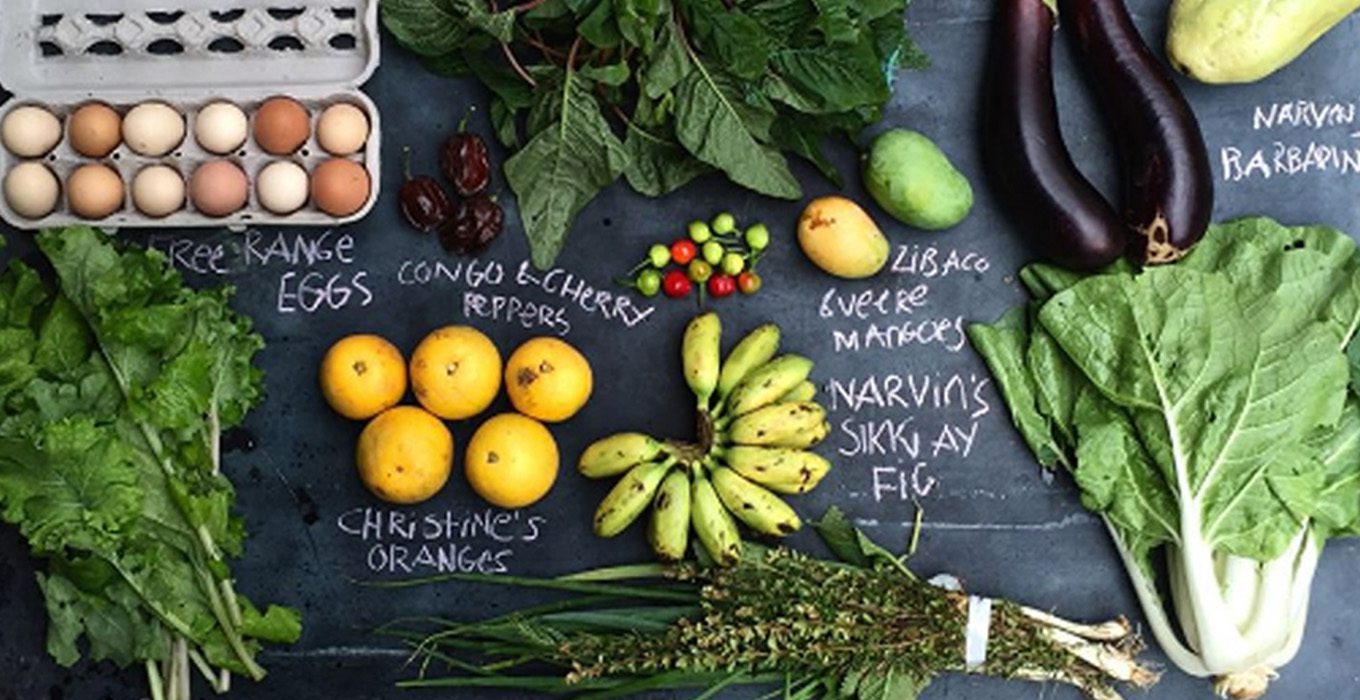
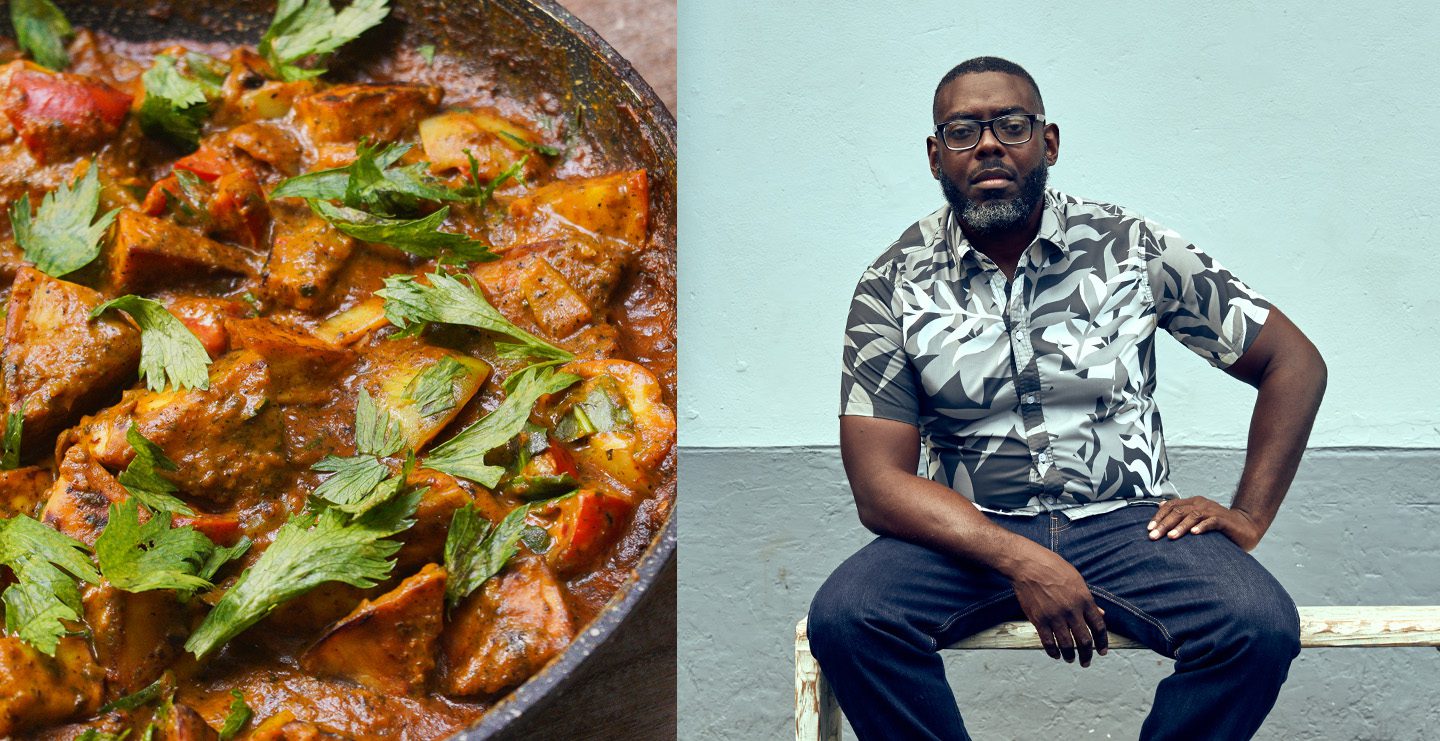
NOVEMBER 19th, 2023
Over geranium tea in Barataria, Trinidad, I met with Baidawi Assing, the creator of the popular Trinidadian You Tube food channel, with 115,000 followers and growing, ‘EatAhfood’.
When I watch cooking shows in beautiful kitchens with gorgeous ingredients and soft background sounds, I’m not home. I mentally escape to somewhere foreign. But when I look at, ‘EatAhfood’ I can’t escape, and I don’t have the usual craving to. I’m fully present, at home in Trinidad and Tobago with ingredients I can buy at the grocery down the road and flavours I may not know the gastronomic details of but recognise the taste. I see faces, hear voices, laughing and ole talk, and I get inspired to make the best buttered cassava, the smoothest bread pudding and tastiest vegetable pakoras ever!
Baidawi and I sat in his home studio sipping his freshly brewed geranium tea and spoke about the initial creation of ‘EatAhfood’, childhood, family influences and how we see and value ourselves as Caribbean people.
So tell me bit about your background.
Baidawi: I grew up in Morvant, mostly. I spent some time by my grandmother in Barataria. So, just between Barataria, San Juan and Morvant, but mostly in Morvant. I went to primary school in Port of Spain; I went to Richmond Street Boys which is an Anglican primary school, but I grew up Muslim; my parents are Muslim.
What was that like? Being Muslim at an Anglican primary school.
Baidawi: It was good. It wasn’t strange to me because I grew up with my father’s mother and she was staunch Pentecostal. We grew up celebrating Christmas; giving gifts and thing, although we were Muslims.
It did make me ask a lot more questions. Like you’re growing up reading the Bible and the Quran. It was an interesting upbringing.
I knew of you long before ‘EatAhfood’ though. I first came across you as ‘Detnator’ making music.
Baidawi: Food and music was always in my life. My father is a musician. Growing up he would be playing the guitar. He was always in a band. We always had band practice and that kinda thing in the house. My mother likes music as well, so I grew up in a musical house I guess.
From small I always wanted to do something with music. I didn’t think I would have ended up doing something with food, because my thing was always music.
I wanted to be a DJ.
I started making mixing and that kinda thing when I was about 8 or 9 just recording music off the radio.
When I was about 12, playing in parties, lil bazaars and ting – birthday parties and that kinda ting. And by age 16, I was like, “Ah want to do more! I want to actually create music now.” We weren’t doing, I guess, what everybody else was doing. I think, my approach to music was always kinda experimental, like, this is my take on what it should sound like. I always liked to fuse things and put things together and do crazy stuff like that.
You pursued ‘Detnator’ for a while, then what happened? Did the love of food take over?
Baidawi: It was a combination of things but the biggest factor was the amount of licks ah take, trying to do music in Trinidad, and just not breaking nor making headway, and that kinda ting. I mean, there were all kinda projects we worked on – like making albums… But the music industry, is a very ‘who-yer-know’ ‘who-know-you’ kinda ting and I didn’t know anybody.
And Food?
Baidawi: Cooking was just part of everyday living.
We were living in a house connected to my grandmother. It was almost like one house, split in two. And food was always a thing.
Back then, we had a lot of fruit trees, in the yard, and my grandmother used to have chickens. I grew up seeing my grandmother killing chickens to make a cook. Climbing trees to pick the fruits, picking bird peppers.
On a Sunday if you want ice-cream, you’ll have to churn the ice-cream yuhself. If you ask your mother to make cake – sponge cake – you’ll have to sit down and whip that butter and sugar yuhself.
And my mom used to sell lil stuff in the neighbourhood. She would sell, sucka bag, bake cookies, make lil beef pies and ting. At one point, she was making doubles too.
My father used to sell chickens – like frozen chickens. He used to go, to a chicken depot in San Juan to buy chickens and we had a deep freeze, so he’ll come back and sell chickens in the neighbourhood, for people who wanted chickens. So yeah, food was always there; food was always a thing.
How did ‘EatAhFood’ start?
Baidawi: ‘EatAhfood’ started with Quincy. We used to be on Triniscene Forum and he started with a thread called, “Bring it to the Table”. It was about his father’s recipe for a macaroni pie, and that thread became so popular because everybody was sharing recipes, or asking how to make this and how to make that. So I said, “Quincy, hear wha going on. It have this new ting, boy, called blogging. Leh we just make a blog.” And he said, “Yeah, cool.” So he turned the thread into a blog and added photos, no videos yet. We were posting the recipes, and what not.
Back then YouTube was mostly people posting old clips of TV shows, and things like that. Until one day I saw a man in his garage fixing his car. And I was like, “This is the future of the Internet!” It blew my mind, because there was this regular man in his garage showing people how to fix a car. I was like, Youtube is going to be regular people doing regular things, just sharing how to do things. And I said, “Quincy, hear what going on. We need to show people recipes and go around and show people things in Trinidad.”
Baidawi: I grew up in Morvant, mostly. I spent some time by my grandmother in Barataria. So, just between Barataria, San Juan and Morvant, but mostly in Morvant. I went to primary school in Port of Spain; I went to Richmond Street Boys which is an Anglican primary school, but I grew up Muslim; my parents are Muslim.
Why do think you were able to break through with ‘EatAhFood’?
Baidawi: I think it was just being committed to improving the product.
We wanted to make sure and really be authentic in what we were doing. So I think people connected with the fact that it was authentic. And just being committed to improving it, wherever it took us. For me, a lot of that was just learning, because I had no experience in video; I knew nothing about it; I knew nothing about lighting, and dem kinda ting. And I’m still learning to this day, and so it’s that. And consistency especially with YouTube. YouTube is literary ‘a monkey on yer back’ when yer start. Especially if you start to look at the analytics; they will let you know when you’re slipping. You need to be posting, posting, posting, posting, posting!”
Now ‘EatAhFood’ has grown so much and you’re producing videos with many different host. How did that happen? Did you seek them out?
Baidawi: That was very organic. The first person I featured was Renee. We were in Krave Restaurant, they invited us down – the bloggers, and what not. So we were there and I was going around with my camera shooting the food. They had the buffet out, and a live station where the chef Renee was preparing, omelettes.
Now, because I know Trinis usually shy away from the camera so I moved it away from her to shoot the food and then she watched me and she said, “What happen? You doh want to put me on camera, or what?” And I said, “Sure! If yuh want to get on camera!” So I picked up the camera, I put it on her, and she started making the omelette and explaining. She was a natural at it! So I asked her to do the show with me.
We sat down and came up with the concept of ‘Simply Local’ and that is how I started working with other people on the channel. It was totally organic.
What has the experience of being a Youtuber been like for you?
Baidawi: I mean, it is interesting. YouTube is no difference to the rest of the world, right? It is a reflection of all the other things you encounter.
Some of my frustrations about the YouTube space is that it is geared mainly towards white American audience. I might search for a Caribbean or African recipe and before the authentic version of that recipe comes up or someone I expect to see cooking comes up, the first result is often a white America man making some African dish, or something like that. And that is just the nature of the algorithm – the nature of the thing. They say they do things, like to have YouTube black that tries to work against that but, I mean, your algorithm is designed a certain way – designed for a specific audience. So that is some of my frustrations with the YouTube space; that it is definitely not balanced.
Is there anything else you’d like to do? Not in place of ‘EatAhFood’ but is there anything else that interest you particularly?
Baidawi: I always wanted to own a restaurant and make food but do it in the way that I want to. Do it the way I think a restaurant in Trinidad and Tobago should be done. There are two places in particular that, I think, is very close to how I envision a restaurant. One of them is Veni Mange. Like when I go inside there, it feels like a Trini restaurant: the feel of the place, etc. and then there is Taryn’s on Mucurapo Road.
Taryn’s is Venezuelan food but the way the place is laid out, it is almost like you’re walking into somebody’s house: terrazzo on the ground. It feels almost like a tuck shop but then you’re walking into the restaurant space, and she’ll be cooking right there. I feel like, yeah, this feels like what I want to do…
The way I got into cooking, it wasn’t through any culinary school or nothing like that; I got into cooking through my parents and my grandmother, and that kinda ting. So for me, cooking is a real personal thing. And even when I’m cooking for the channel I have a budget allocated to cooking food. When I cook food, basically that is what I’m going to eat that day. Even when I cook a big dish and my friends are over and they come eat. Cooking for me was always that; it was always a real personal thing. So I’m also kinda afraid of what might happen to my relationship with cooking, in terms of having to meet the demands of a business-business. Obviously, I will make things how I think they should taste and then somebody comes in yuh restaurant and say, “That is how yuh does make that!” I go get vex, yuh understand? We’ll see how it go.
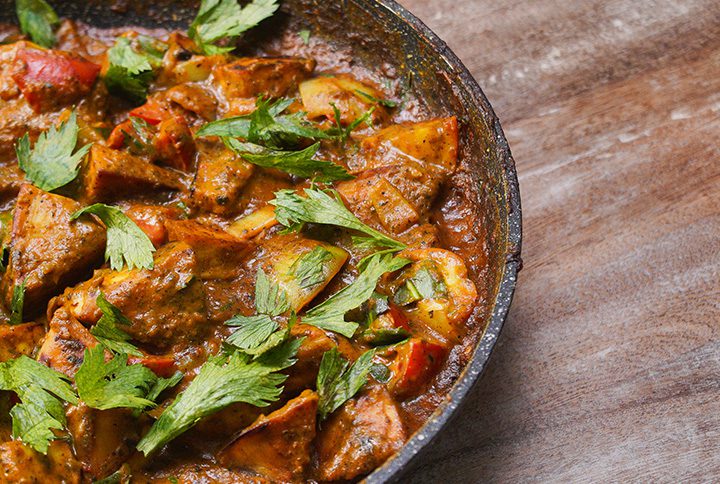
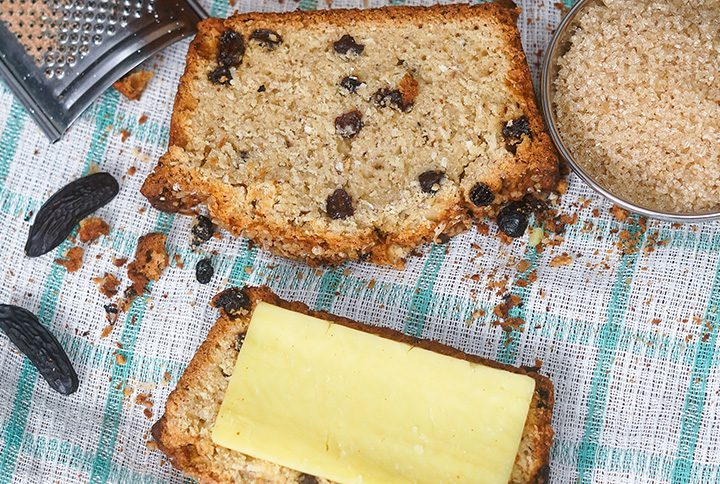
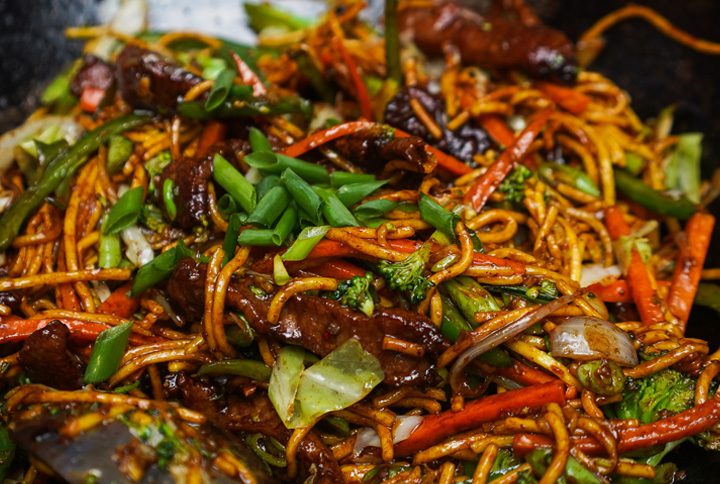
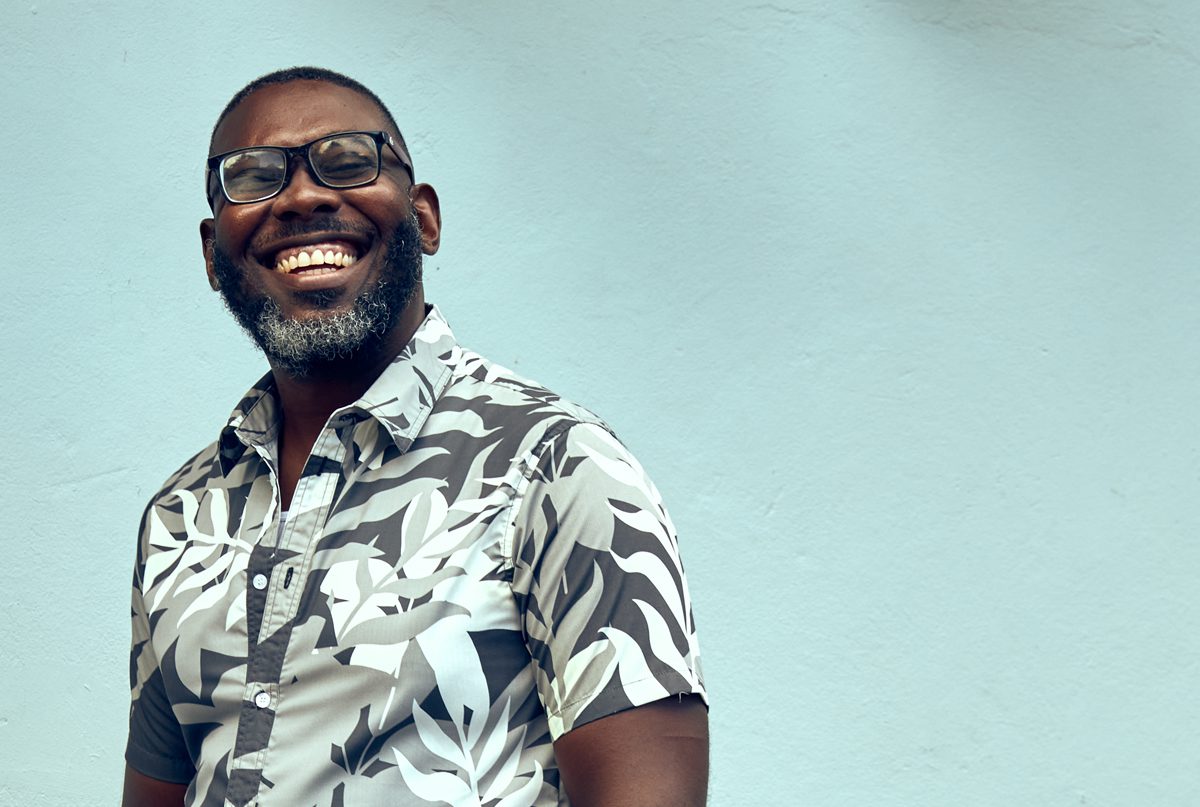
Interviewer: Tanya Marie | Portrait PhotographER: Marlon James. | Food photography courtesy: EATAHFOOD. | SHIRT: THE LUSH KINGDOM